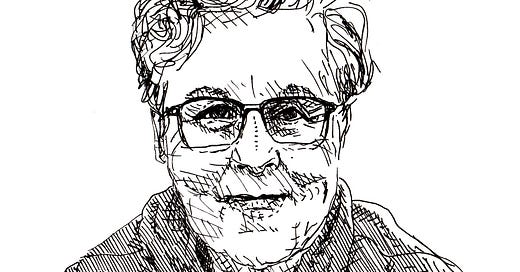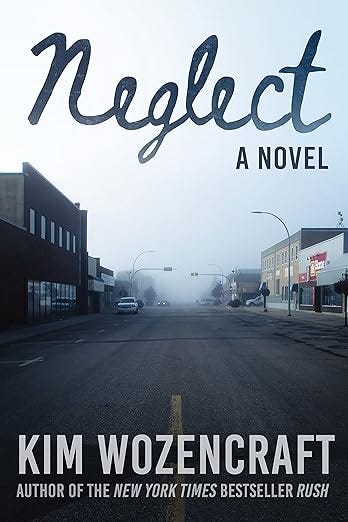Ask a Sober Oldster #10: Author Kim Wozencraft
"It’s nice to have my wits about me, even in unpleasant circumstances..."
This monthly interview series is a collaboration between Oldster Magazine and The Small Bow, A.J. Daulerio’s excellent newsletter about recovery and mental health, and will appear in both newsletters. Learn more about this collaboration in this Oldster podcast/videocast episode.

Kim Wozencraft is the author of six novels, including the internationally best-selling Rush, which was adapted into a film starring Jennifer Jason Leigh. Her work has appeared in The Best American Essays, the Los Angeles Times, Texas Monthly, Chronogram, and numerous literary magazines and anthologies. She holds a Master of Fine Arts degree from Columbia University and teaches literature and writing at SUNY New Paltz.
—
How old are you, and how long have you been in recovery?
I’m 69, in my fifteenth year of recovery, and grateful every day.
How did you get there?
On a long and winding road that led through many short-lived attempts to stop drinking and a couple of longer-lasting efforts that I couldn’t sustain. It took utter desperation before I could manage to pull my head out of the bottle. So, short answer: like so many others, I arrived kicking and screaming. With the support of a few dear friends and a Twelve Step program, I finally managed to string together more than year or two without a drink. And life got better.
What are the best things about being in recovery?
I don’t miss the hangovers at all, but being able to be there for my family and friends is number one on my list. It’s nice to have my wits about me, even in unpleasant circumstances, and running into sober friends pretty much anywhere is a treat.
Also my posture is better (though it’s still not great because I spend so much time hovering over a keyboard). I will never forget the day I was walking into the grocery store and realized I was seeing the sky because I wasn’t looking down at the pavement, ashamed of myself because I couldn’t quit drinking. And eventually I had to adjust my rear view mirror because I was sitting up straighter, not slumping from guilt. The body really does keep the score.
What’s hard about being in recovery?
These days, most of the time, nothing about it is hard. It’s easy. On some days, though? Everything. Every little thing. But usually I can catch myself when I fall into that trap and laugh at myself as I drag poor pitiful me back to the surface, or at least I can remember that “this, too, shall pass” and remind myself how lucky I am to be alive and sober and living in such a beautiful place as the Hudson Valley.
How has your character changed? What's better about you?
I hope that I’m better able to listen and empathize and not be quite as solipsistic as I was when I was actively alcohol dependent. Usually I can recognize when I go into my default me-me-me mode and can pull the camera way back very fast until I can see myself as the speck of carbon that I am and at the same time appreciate that my consciousness is part of something I cannot currently fathom (and maybe never will). But I can be swept away by the beauty of the night sky or the daytime moon and the amazing, incredible universe, visible and invisible, all around us. I think I understand the difference between humility and humiliation and I like being, as Charlotte the spider wrote in the final web she spun above Wilbur the pig, “humble.” It feels way healthier than being ashamed.
My posture is better (though it’s still not great because I spend so much time hovering over a keyboard). I will never forget the day I was walking into the grocery store and realized I was seeing the sky because I wasn’t looking down at the pavement, ashamed of myself because I couldn’t quit drinking. And eventually I had to adjust my rear view mirror because I was sitting up straighter, not slumping from guilt.
What do you still need to work on? Can you still be a monster?
Trick question? It presumes (correctly of course) that I was a monster in the past. I know at times I was, and when I wasn’t, I feared being one. I still do, and hopefully I always will. I have to know and remember every day that if I drink, the monster will emerge. It’s a given. My monster is actually twins, Amy G. and Dal A., which spelled out as a single word is amygdala, and that is how I think of the monster in my brain. It lives to react to fear and can cause emotional chaos at the drop of a memory. That’s when it will whisper to me that I need a drink. But rational me has learned the hard way, several times over, where that will lead.
One big challenge is that I have long-term PTSD from having experienced gun violence in my early 20s. I sometimes still have irrational reactions to situations I incorrectly perceive as threatening. But as long as I’m sober, I can recognize them for what they are. It’s unpleasant; sometimes it’s more than unpleasant, but self-medicating with alcohol was ineffective and had seriously severe side effects.
What’s the best recovery memoir you’ve ever read? Tell us what you liked about it.
I have to go with Lit by Mary Karr because dang, that girl can write and plus honesty and beauty and redemption and funny. And also I can relate to Texas and Catholic since those are my roots.
What are some memorable sober moments?
Walking in the woods about three months into sobriety and suddenly seeing my surroundings through new eyes; it was as if I had been viewing the world as a black-and-white film in two dimensions and now it was technicolor 3D. Stunning. And so beautiful.
Emerging from therapy and finding that my car had a flat tire and it was only an inconvenience, not the end of the world.
Feeling the sogginess evaporate from my brain over the course of the first few months of sobriety, recognizing the return of (mostly) fully functional neurons, and of course that moment: what the hell was I thinking? and realizing that I hadn’t been; I’d been on ethanol autopilot.
Are you in therapy? On meds? Tell us about that.
I’m not in therapy at the moment, but I’m a believer and have done years of therapy off and on and usually found it helpful. I was on medication early in my recovery and found it very helpful. The relationship between mental health issues and addiction is pretty solidly established at this point; if medication is useful and can reduce someone’s suffering, I’m all in favor of it. There’s plenty of suffering around and no need to add to it due to outdated and sometimes puritanical attitudes about dependency and addiction.
One big challenge is that I have long-term PTSD from having experienced gun violence in my early 20s. I sometimes still have irrational reactions to situations I incorrectly perceive as threatening. But as long as I’m sober, I can recognize them for what they are. It’s unpleasant; sometimes it’s more than unpleasant, but self-medicating with alcohol was ineffective and had seriously severe side effects.
What sort of activities or groups do you participate in to help your recovery? (i.e. swimming, 12-step, meditation, et cetera)
Walking in the woods is something I do pretty much daily except when the weather makes it dangerous. It’s a form of meditation. I also do the kind where you sit still and breathe, but I prefer moving. I love bicycling, particularly at the Ashokan Reservior, and gardening is essential. Digging in the dirt is sacred to me (though grubs and mosquitoes are not). I still participate in Twelve Step activities, though not as religiously as I did in my early years of recovery. That was and is a life-saving experience and I am forever grateful for the friendship and support, and glad to be a friend.
Are there any questions we haven’t asked you that you think we should add to this? And would you like to answer it?
Q: What is the best lie you’ve told while in recovery when someone was pressuring you to take a drink?
A: I was only a few weeks in, and was at a political function where someone was getting a bit pushy about “Oh, come on, have a drink,” and I told them I couldn’t because I was in training for an upcoming State of Connecticut martial arts championship the following weekend. It was kind of true, but I wasn’t seriously training for the event, I was just trying to get through the days at that point. A friend had advised me to do whatever I needed to do, say whatever I needed to say, just don’t drink. Focus on that. It was good advice. When someone is in those first weeks of trying to get sober, it’s okay to say whatever they need to if they find themselves in a situation where someone is pressing them to drink. Of course, some people might prefer to just tell the pushy person to take a hike. All these years later, that’s probably what I would do.








Thanks for holding the lantern for us 60 somethings negotiating early sobriety and aging at the same time. Good era to have your wits about you. This interview was helpful and hopeful.
Oh, this is lovely. I remember reading RUSH for a film company I worked for, and the big buzz it caused. I was also in recovery, and crossed my fingers that Kim would survive and thrive...so glad she has. xo a sister speck of carbon.